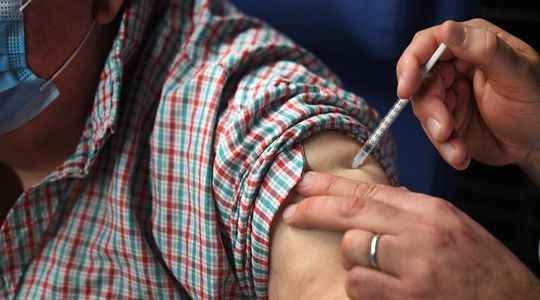They could already inject the vaccine against the flu and that against Covid-19. Since Monday, November 7, pharmacists have been authorized to administer 14 new vaccines, recommended in the vaccination schedule in force, to people over the age of 16, as explained by the Order of Pharmacists.
“Qualified pharmacists are authorized to administer, on medical prescription of the product, vaccines against diphtheria, tetanus, poliomyelitis, whooping cough, human papillomaviruses, invasive pneumococcal infections, hepatitis A and B viruses, meningococci of serogroups A, B, C, Y and W and against rabies”, describes the Order of Pharmacists on its site. The objective is “to improve vaccination coverage in France and to facilitate the course of the patient wishing to be vaccinated”, explains the Order of Pharmacists. The professional body specifies that it is the Social Security financing bill (PLFSS) for 2023, adopted on October 31 at the National Assembly thanks to 49.3 triggered by Prime Minister Elisabeth Borne, who planned this expansion of their prescription possibilities.
The measure is acclaimed by professionals in the sector and represents a significant change for both pharmacists and patients. “They (the patients) were obliged to go to the doctor, to have a prescription, to come back to get the medicine and then to make another appointment, which meant a lot of consultations for not necessarily a proven medical benefit. Now, the pharmacies will be able to participate in this effort”, welcomes with Franceinfo Matthieu Saulnier, pharmacist in Nanterre.
A “short interview” for pregnant women
The challenge is also financial for pharmacies, as it recalls The echoes. Indeed, the remuneration for the act of vaccination has been set at 7.50 euros including tax – as for the flu – when the person has a prior prescription drawn up by a health professional or when the delivery of the vaccine does not require prescription. It rises to 9.60 euros including tax when the prescription comes from the pharmacist. The Union of Community Pharmacists (Uspo) assesses the financial impact of this measure at 50 million euros .
The extension of vaccination in pharmacies was recorded in March 2022, when the new agreement organizing the relationship between pharmacists and health insurance was signed. Two decrees published in the Official Journal (OJ) at the end of March and the end of April then came to specify the terms.
The role of pharmacists should be further strengthened by the PLFSS for 2023. The text includes “a measure likely to allow the prescription of certain vaccines by pharmacists”, notes the Order of Pharmacists on its site, while, “at this day and apart from the flu vaccine, regulations do not allow pharmacists to prescribe vaccines.
Pharmacists also have the possibility, from this Monday, of offering a “short interview” to pregnant women in order, in particular, to “take stock of the drugs prescribed or taken in self-medication”, to “check that she has not not stopped a prescribed medication alone” or even to “inform her and generally discuss the risks for her and the fetus associated with taking medication” and “to discuss the risks associated with the consumption or use of “other substances” such as alcohol can be read on the website of the Order of Pharmacists. The objective is to “raise awareness of the risk associated with the consumption of teratogenic or feto-toxic substances during pregnancy and, where appropriate, the importance of vaccination.”
